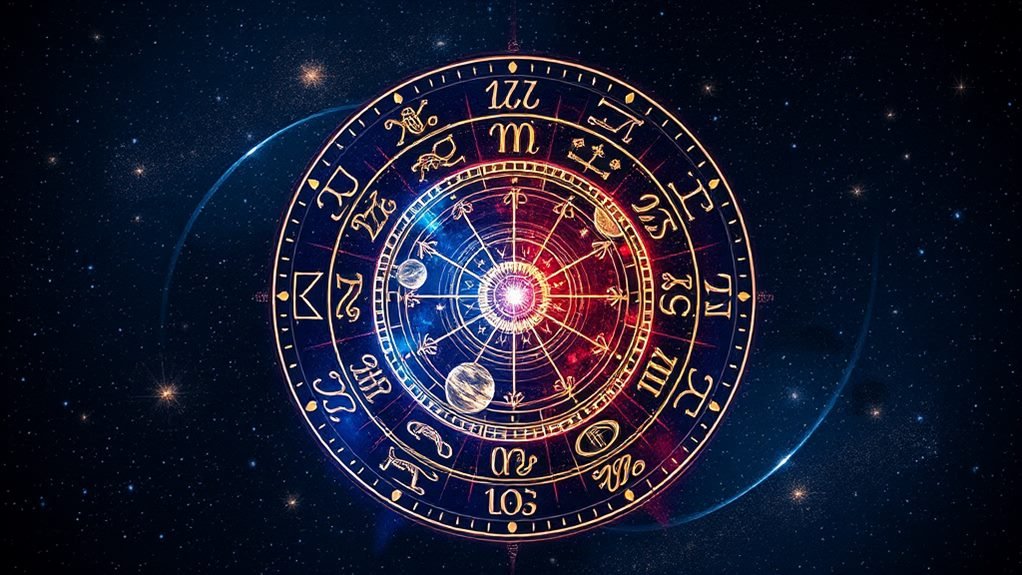Where Did Astrology Signs Come From
The origins of astrology signs trace back to ancient civilizations such as the Babylonians, Egyptians, and Greeks, who laid the groundwork for the zodiac system we recognize today. But have you ever wondered about the intricate connections between celestial movements and human traits that underpin these signs? Exploring the historical evolution and cultural influences that have shaped astrology signs offers a fascinating insight into our enduring fascination with the stars and their symbolic significance in our lives.
Key Takeaways
- Babylonians divided the sky into 12 parts, laying the foundation for the zodiac system.
- Greeks assigned traits based on constellations, adding mythological depth to astrology signs.
- Celestial symbolism from ancient civilizations influenced the development of astrology signs.
- Cultural interpretations enriched astrological meanings over time.
- Modern astrology reflects a blend of historical roots and diverse cultural influences.
Ancient Origins of Zodiac Signs
The ancient origins of the zodiac signs can be traced back to the Babylonians, Egyptians, and Greeks, who laid the foundation for the symbolic representation of personality traits and qualities through the division of the sky into 12 parts. Celestial symbolism and cultural influences played a significant role in shaping the early astrological evolution.
The concept of assigning specific personality traits to each zodiac sign based on the constellations was a pivotal development. Over time, different cultures added their interpretations, enriching the zodiac signs with diverse meanings. This amalgamation of beliefs and observations led to the intricate system we recognize today, where each sign is associated with distinct characteristics and influences.
The ancient origins of astrology signs reflect a long history of human fascination with the cosmos and its connection to individual traits.
Babylonian Contribution to Astrology
Dating back over 2,000 years, the Babylonians made significant contributions to the evolution of astrology through their division of the sky into 12 parts, laying the foundation for the zodiac system.
Their Babylonian astrology roots had astronomical significance, as they used these divisions to track the movement of celestial bodies.
These cultural influences led to the development of astrological symbolism, where each part of the zodiac represented different aspects of human life and personality.
The Babylonians' early work in astrology set the stage for later civilizations, such as the Greeks and Romans, to further refine and expand upon these astrological ideas.
Through their innovative approach to understanding the skies, the Babylonians made lasting contributions to the field of astrology.
Greek Influence on Astrology Signs

Influencing the development of astrology signs, the Greeks contributed unique insights by assigning specific traits and characteristics to each zodiac sign based on the constellations. This influence rooted in Greek mythology and astrological symbolism shaped the way individuals perceive their astrological identities.
Key aspects of Greek influence on astrology signs include:
- Mythological Interpretations: Greek mythology provided rich narratives that aligned with the characteristics attributed to each zodiac sign, adding depth and meaning to astrological symbolism.
- Symbolic Associations: The Greeks associated different constellations with specific personality traits and qualities, forming the basis for astrological interpretations.
- Cultural Legacy: The Greek influence on astrology signs left a lasting legacy, shaping how astrology is understood and practiced in modern times.
Evolution of Astrological Systems
Astrological systems have undergone significant transformations throughout history, reflecting diverse cultural influences and evolving interpretations of celestial phenomena. Cultural influences from civilizations such as the Babylonians, Egyptians, Greeks, and Indians have shaped astrology's global evolution.
These influences led to the development of modern adaptations in astrological systems, incorporating varying beliefs and practices. The zodiac, originally created by the Babylonians, has evolved to include rising signs, moon signs, and elements from different cultures.
Different astrological systems emerged worldwide, each with its unique interpretation and significance. Today, astrology continues to adapt and evolve in modern times, demonstrating its resilience and ability to incorporate new ideas while maintaining its historical roots.
Interpretation of Astrology Signs

The interpretation of astrology signs plays a significant role in providing insights into individuals' personalities and characteristics.
Modern Interpretations:
- Personal Growth: Modern interpretations focus on personal growth and self-awareness, encouraging individuals to reflect on their behaviors and tendencies.
- Relationship Dynamics: Astrology signs are used to analyze relationship dynamics, offering insights into compatibility and potential challenges.
- Career Guidance: Astrology is consulted for career guidance, helping individuals understand their strengths and potential career paths.
These interpretations provide not only psychological insights but also practical guidance in various aspects of life. Astrology continues to adapt to modern contexts, offering individuals a lens through which to explore themselves and their relationships.
Controversies Surrounding Astrology
Controversies surrounding astrology have long been a topic of debate, with skepticism stemming from the lack of scientific evidence supporting its claims. Scientific skepticism questions the validity of astrological practices, arguing that predictions are often vague and inconsistent.
Modern interpretations of astrology have faced criticism for lacking empirical evidence to substantiate its claims. The scientific community largely views astrology as a pseudoscience, with studies yielding mixed results on its accuracy. Critics challenge astrology's assertion of predicting the future, emphasizing the reliance on generalized statements.
Despite these controversies, astrology maintains a significant following and popularity, impacting various aspects of society.
Impact of Astrology on Society

Influencing societal norms and cultural trends, astrology signs have left a lasting impact on various facets of contemporary society. This impact can be seen through:
- Community Bonding: Astrology signs provide a common ground for individuals to connect, fostering a sense of community based on shared traits and experiences.
- Cultural Influence: Astrology has influenced various aspects of society, shaping fashion trends, entertainment choices, and even business strategies, reflecting its integration into mainstream culture.
- Personal Guidance and Entertainment: Astrology signs remain popular as tools for self-reflection and entertainment, offering individuals personal meaning and guidance in their lives. The enduring popularity of astrology signs highlights society's continued fascination with the mysteries of the universe.
Historical Roots of Astrology Signs
Originating from ancient civilizations, astrology signs have deep historical roots that trace back to the Babylonians, Egyptians, and Greeks. Celestial symbolism played a significant role in the development of astrology signs, with early civilizations correlating celestial bodies with human characteristics and behaviors.
The Babylonians, around 2,000 years ago, divided the sky into 12 parts, creating the zodiac system that symbolizes different personality traits and qualities. Cultural influences from the Greeks further enriched astrology by assigning specific traits to each sign based on the constellations.
Over time, different cultures and beliefs shaped astrology, leading to variations like the Indian Vedic system. These diverse cultural influences continue to impact astrology signs, making them a rich tapestry of celestial and human connections.
Conclusion
In conclusion, astrology signs have ancient origins rooted in civilizations like the Babylonians, Egyptians, and Greeks. The Babylonians established the zodiac system, while the Greeks added mythological interpretations to astrological symbolism.
Over time, diverse cultural influences have shaped astrology signs, with each culture contributing unique meanings to the celestial symbolism. Despite controversies, astrology continues to impact society, reflecting the historical roots and evolution of astrology signs.
🔴 Need Clarity on your Situation?



